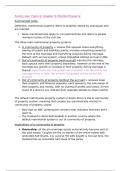Summary
Summary Family law notes on the matrimonial property systems
- Course
- Institution
- Book
These are summarized notes from gathered information and the law of persons and family law textbook, they cover chapter 8 of the textbook concerning the matrimonial property system more specifically the basics of the beginning of the topic.
[Show more]



